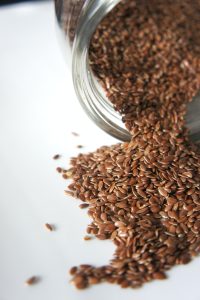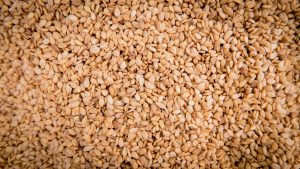
Sesame seeds are a staple ingredient in many cuisines around the world. In the United States, they’re most commonly associated with their use on hamburger buns and bagels. But sesame seeds have a long and storied history, extending well beyond the fast-food restaurants and grocery store aisles of today. From Assyria to Egypt to India, sesame seeds have been used as a culinary and medicinal ingredient for centuries.
Sesame seeds are small, oval-shaped seeds that come from the sesame plant. They’re native to India and the Middle East, where they’ve been cultivated for centuries. Sesame plants are annual herbs that grow up to three feet tall and produce small, light-colored flowers. The seeds are harvested when the plant’s pods have ripened, and then dried and roasted to bring out their flavor.
Nutritional Benefits of Sesame Seeds
Sesame seeds are a nutrient-dense food that is low in calories and fat but high in essential vitamins, minerals, and healthy fats. They are an excellent source of fiber, protein, and a variety of minerals such as iron, zinc, phosphorus, and magnesium. Sesame seeds also contain a wide range of B-vitamins, such as thiamin, riboflavin, niacin, and folate, as well as essential fatty acids, including omega-3 and omega-6.
There are several health benefits associated with consuming sesame seeds. They are known to help reduce the risk of type-2 diabetes and heart disease, improve blood sugar control, and promote good digestion. They may also help protect against certain types of cancer, lower cholesterol levels, and reduce inflammation in the body. In addition, sesame seeds are a great source of calcium, which is important for bone health.
Sesame seeds are a versatile and convenient addition to any diet. They can be eaten raw, toasted, or added to recipes. They can be used in a variety of dishes, including salads, soups, stews, stir-fries, and baked goods. Sesame seeds are a great source of plant-based protein, and can be used as a substitute for animal protein in vegan and vegetarian recipes.
Sesame seeds are also a great source of healthy fats. They contain both monounsaturated fats, which are beneficial for heart health, and polyunsaturated fats, which are essential for cognitive function. The seeds are also a good source of antioxidants, which can help fight off free radicals in the body and reduce the risk of certain types of chronic illnesses.
History of Sesame Seeds
Sesame seeds are a popular ingredient in many cuisines around the world, but their history is far more interesting than many people realize. Sesame seeds have been around for thousands of years, and their history is closely intertwined with the development of cultures, religions, and cuisines around the world.
Sesame seeds have been cultivated since at least 3000 BC in Ancient Mesopotamia, and were likely used for culinary, medicinal, and ritualistic purposes. In Ancient Egypt, sesame was known by a variety of names, including sesemtu, and was used in a variety of dishes, including breads and pastries. Sesame was also used to make oil and in various medicines.
The use of sesame seeds spread into the Mediterranean region and beyond throughout the classical period. The Greeks and Romans used sesame seeds for culinary and medicinal purposes, and during the Middle Ages, sesame was brought to India, where it was used to make a variety of dishes. In India, sesame is still widely used in cooking, and is particularly popular in the state of Tamil Nadu.
The ancient Jews also used sesame seeds in their cooking, and they are mentioned numerous times in the Bible. Sesame seeds are often associated with the Jewish Passover celebration, and are still used in various dishes during the holiday. During the Middle Ages, sesame seeds were brought to the Middle East, where they were used to make a variety of dishes.
In the West, sesame seeds were used in various forms, including in salads, sauces, and as a topping for breads. During the Renaissance, sesame seeds became a popular ingredient in European cooking, and were used in a variety of dishes, including savory tarts, soups, and sauces.
Sesame seeds are now used around the world in a variety of dishes, including salads, soups, and sauces. They are also used to make sesame oil, a popular ingredient in Asian cuisines. Sesame is also used in various confectionary items, such as halva and sesame brittle.
Cooking with Sesame Seeds
One of the most popular ways to use sesame seeds is to make a savory sauce or condiment called tahini. Tahini is made by grinding sesame seeds into a creamy paste, which can be added to salads, sauces, soups, dips, and marinades. It is often used in Middle Eastern, Mediterranean, and Asian cuisines as a flavorful and healthy addition.
Sesame seeds can also be used as a crunchy topping for salads, casseroles, and stir fries. They provide a delightful texture and can help to add a nutty flavor to the dish. They can also be used to make a savory snack mix, by combining them with other crunchy ingredients such as nuts and dried fruit.
Sesame seeds are also a great addition to baked goods. They can be sprinkled on top of breads and muffins for a delightful crunch, or incorporated into the recipe if desired. Sesame-crusted fish is also a great way to infuse a meal with a delicious flavor. Simply dip the fish in a mixture of sesame oil and sesame seeds, and then bake or pan-fry until the fish is cooked through.
Sesame seeds can also be used to make a variety of sweet treats. They are often used to make halvah, a Middle Eastern confection made with crushed sesame and sugar. They can also be used to make cookies, bars, or other desserts.

Clinical Studies on Sesame Seeds
Recent clinical trials have found that sesame seeds are a powerful source of antioxidants. Antioxidants are compounds that help protect the body from oxidative stress, which can lead to a wide range of diseases and health conditions. In one study, which was conducted by the Chinese University of Hong Kong, sesame seeds were found to have the highest antioxidant capacity of all nut and seed proteins tested.
In addition to their antioxidant properties, sesame seeds may also help reduce inflammation. Inflammation is a natural part of the body’s immune response and can be beneficial in fighting off infection and injury. However, chronic inflammation has been linked to a range of diseases and health conditions, including heart disease, stroke, and cancer. In one study, sesame seed oil was found to significantly reduce inflammation in rats.
Clinical trials on sesame seeds have also suggested that they can help reduce blood pressure. High blood pressure, or hypertension, is a major risk factor for heart disease and stroke. In one study, sesame seed oil was found to significantly reduce blood pressure in rats. This effect was attributed to the antihypertensive compounds found in sesame seeds, such as sesamin, sesamolin, and sesamol.
Sesame seeds may also help reduce the risk of certain types of cancer. In one study, sesame seed oil was found to significantly reduce the growth of liver cancer cells. This effect was attributed to the antioxidant and anti-inflammatory properties of sesame seeds.
Sesame seeds may also help reduce the risk of certain types of diabetes. In one study, sesamin, a compound found in sesame seeds, was found to significantly reduce the risk of type 2 diabetes in mice. This effect was attributed to the anti-inflammatory and antioxidant properties of sesame seeds.